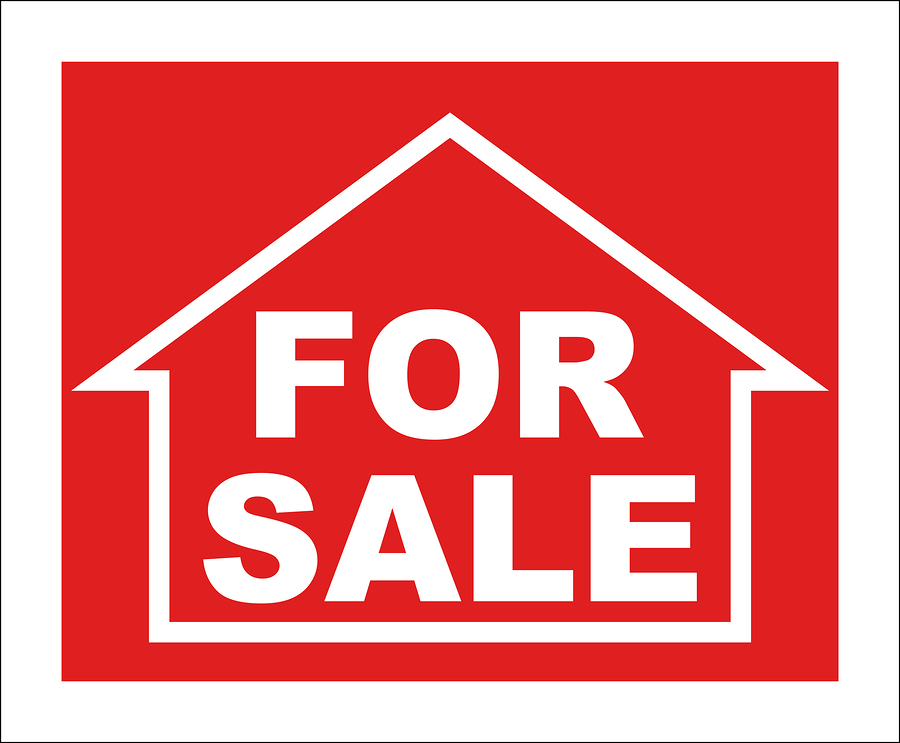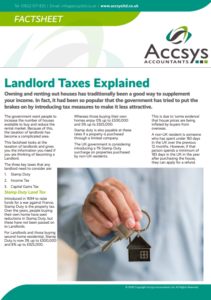Landlord Taxes Explained
Owning and renting out houses has traditionally been a good way to supplement your income. In fact, it had been so popular that the government has tried to put the brakes on by introducing tax measures to make it less attractive.

The government want people to increase the number of houses available to buy and reduce the rental market. Because of this, the taxation of landlords has become a complicated area.
This factsheet looks at the taxation of landlords and gives you the information you need if you are thinking of becoming a Landlord.
The three key taxes that any landlord need to consider are:
- Stamp Duty
- Income Tax
- Capital Gains Tax
Stamp Duty Land Tax
Introduced in 1694 to raise funds for a war against France, Stamp Duty is the property tax. Over the years, people buying their own home have seen reductions in Stamp Duty, but these have not been passed on to Landlords.
For Landlords and those buying second home residential, Stamp Duty is now 3% up to £500,000 and 8% up to £925,000.
Whereas those buying their own homes enjoy 0% up to £500,000 and 5% up to £925,000.Stamp duty is also payable at these rates if a property is purchased through a limited company.The UK government is considering introducing a 1% Stamp Duty surcharge on properties purchased by non-UK residents.
This is due to ‘some evidence’ that house prices are being inflated by buyers from overseas.A non-UK resident is someone who has spent under 183 days in the UK over the previous 12 months. However, if that person spends a minimum of 183 days in the UK in the year after purchasing the house, they can apply for a refund.
Income Tax
Rental income of residential property is kept separate from your other income on your self-assessment tax return, and a separate profit and loss are required to calculate taxable rental profits.
The reason is that there are individual rules for allowable deductions of rental profit, and losses from rental properties cannot be offset against total income only profit from other rental properties.
Allowable Deductions
Expenses incurred in running your rental property business are split between two categories – Capital and non-capital expenditure.
Non-capital expenditure is allowable against your income – Capital expenditure is allowable against your gains when you sell the property.
Capital expenditure is any costs that are not straightforward repairs or replacement for existing items but constitute an improvement to the long-term value of the property.
Non-capital are any costs incurred in the running of the business such as telephone or anything spent on the properties that can be considered renewal or repairs.
For example, repairing or renewing a bathroom suite would be non-capital, but upgrading the suite to include a jacuzzi bath or walk-in shower would be capital.
Mortgage Interest
Until recently interest on finance costs were tax-deductible at whatever rate you pay tax. Now they are only deductible at 20%. This means if you are a higher rate taxpayer, you only receive tax relief on your interest payments at the basic rate.
Capital Gains Tax (CGT)
The rate at which you pay CGT following the sale of a buy-to-let property depends on your taxable income. If you have an income of £50,000 or less, the rate is 18% up to the basic rate threshold and 28% on any gain after that.
For example, if you bought a rental property ten years ago for £100,000 and sold it today for £150,000, your Capital Gain would be £50,000. Of this, £37,700 would be taxable after allowing for you CGT Annual Exemption.
Assuming no other tax reliefs, your CGT bill on this transaction would be £6,786 (if the entire gain falls within the basic rate band) or £10,556 (if you’re a higher-rate taxpayer). The good news is that Capital Gains don’t count as income, so this £37,700 won’t push you into a higher tax bracket.
From 6th April 2020, any gains made on residential properties must be notified to HMRC and the estimated tax paid within 60 days from the date of completion.
CGT Tax Reliefs
There are some reliefs for CGT for example if you have lived in the property and it was your main residence you will get relief for this time plus the last 9 months of your ownership.
There are allowable expenses for disposal of properties these include
- Estate agents’ and solicitors’ fees
- Stamp duty paid when the property was purchased
- Surveying and valuation costs
- Capital Costs linked to improvement work – e.g. an extension
To find out more about the Taxation of Landlords and to discuss your individual circumstances, please contact us.


